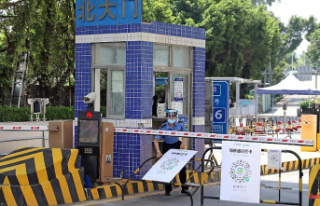Actually, the nationwide successor to the 9-euro ticket is supposed to start on January 1st. But the implementation is complex, warns Stuttgart Transport Minister Hermann. Like most states, Baden-Württemberg makes its approval dependent on a clear condition.
Baden-Württemberg's Transport Minister Winfried Hermann doubts that the planned nationwide local transport ticket can start at the turn of the year. When asked whether the 49-euro ticket would come in January, the Greens politician told the partner newspapers of the Neue Berliner Redaktionsgesellschaft: "Probably not."
The countries wanted to implement the ticket as quickly as possible. "It may not come until March 1st or April 1st." The implementation would be complex, Hermann said. "The state share of 1.5 billion euros must be anchored in the budgets of the states. Baden-Württemberg closes its budget on December 20. How are you supposed to be there on January 1?"
In the "Süddeutsche Zeitung", Hermann also pointed out that machines would have to be converted, tariff systems adjusted and committee decisions made. With a view to the federal-state summit this Wednesday, the minister also reiterated the call for more federal subsidies for local transport, which the states had made a condition for the ticket. "If the federal government refuses to increase the regionalization funds demanded by the states, we unfortunately have to say 'no' to the ticket," he told the "SZ".
Actually, there is already agreement that a 49-euro ticket should be created. But the federal states make permanently higher subsidies from the federal government a condition. That is what the deliberations of the heads of state and government with Chancellor Olaf Scholz in Berlin are all about.
As can be seen from the draft resolution, the federal government wants to make a new offer to the states: for 2022 it wants to pay additional so-called regionalization funds of one billion euros, from 2023 onwards they are to be increased by three percent annually. It is questionable whether this is enough for the federal states - they had asked for 1.5 billion euros more from this year.
In addition, according to the ideas of the federal states, the federal government should increase the regionalization funds in 2022 and 2023 by 1.65 billion euros each due to the increased energy prices. "If the increase in regionalization funds doesn't come, we can't make the ticket," emphasized Hermann in an interview with the Neue Berliner Redaktionsgesellschaft.
"The energy and personnel costs have risen enormously in the past few months. In order to maintain the status quo, we are dependent on increasing the funds." In the end, it doesn't do anyone any good "if we have a cheap ticket but not enough money to finance public transport and thin out timetables".












